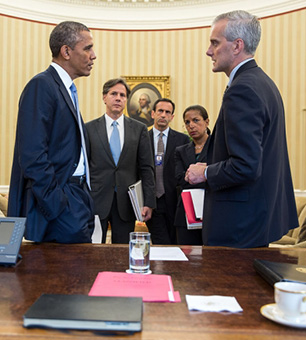Honest, paywall-free news is rare. Please support our boldly independent journalism with a donation of any size.
Chief among the reasons to be skeptical about the Obama administration’s latest gambit for peace in Israel-Palestine is its own record on the subject. Barack Obama’s approach to the Israeli-Palestinian conflict, according to Josh Reubner, resembles hammering a square peg into a round hole. And it’s no small surprise the pieces don’t fit.
Ruebner, the national advocacy director of the U.S. Campaign to End the Israeli Occupation, lays out his argument in a new book, the accessible and engaging Shattered Hopes: The Failure of Obama’s Middle East Peace Process. It’s a biting critique.
Here is a book that does not ignore the enormous power differential between Israel and the Occupied Territories—that tells it like it is with no apprehension or sugar coating. Having consulted both leaked classified sources and publicly available documents, Ruebner fillsShattered Hopes with an abundance of evidence culled from primary sources, allowing readers to see for themselves the seemingly endless mistakes that characterize the so-called “peace process.”
The first half of the book presents a play-by-play history of the Obama administration’s attempts to negotiate a peace deal. One by one, Reubner offers a context, description, and critique of each attempt, as well as a report of Israel’s response. This section spans from the time preceding Obama’s election, including his prior relationship with the conflict and with Palestinians, to the events surrounding Operation Cast Lead and the 2012 bid by the Palestinian Authority to be recognized as a UN member state.
Ruebner examines Washington’s failure to involve the Palestinian negotiating team in negotiations and lays bare the ugly details of Netanyahu’s plan for a neutered Palestinian state. He carefully illustrates the difficult positions Palestinians have been put into during past negotiations, such as when the Obama administration abandoned efforts to seek an Israeli settlement freeze as a precondition for talks, placing “Palestinians in the untenable position of either being forced to negotiate with Israel while it continued to colonize Palestinian land, or to rebuff the initiative and be portrayed by Israel and its supporters in the United States as the rejectionist party.” He details the many ways that Israel has continuously manipulated the United States into supporting Israeli actions—such as its aggressive settlement expansion—that defy stated U.S. policies and interests.
The second half of Shattered Hopes explores various themes that emerge in the Obama administration’s diplomatic policies, including its blocking of international efforts to hold Israel accountable for its actions. This includes its active opposition to the Goldstone Report (the result of a 2009 UN fact-finding mission on the Gaza conflict), which helped to create a sense of impunity for Israel. Here Reubner also contrasts the strengthening of the U.S.-Israel military relationship ($3.1 billion dollars of military aid in 2013) with how U.S. aid to Palestinians is “specifically designed to de-develop the Palestinian economy” and “reconcile [Palestinians] to their open-air prison existence by making it slightly more palatable.”
Reubner also sheds some light on how Washington’s staunch support for Israel affects its relationships with its allies, such as when the United States “indefinitely postponed a planned multinational military exercise scheduled to take place in Turkey in October 2009” because Turkey, outraged over Cast Lead and protesting Israel’s continued colonization of Palestinian land, removed Israel from the exercise.
Reflecting on the standoff over Israel’s deadly 2010 attack on a Turkish-flagged aid flotilla to Gaza, Reubner quips that “the United States found itself in the unenviable position of trying to explain how both of its allies’ reports could be credible if they were diametrically conflicting.”
The book concludes with a final, clear analysis that explains the many reasons Obama has so far failed to broker a Middle East peace: Namely, Obama’s failure to recognize the asymmetry of power between Israel and Palestine—exacerbated by his provision of “unconditional military and diplomatic support” to Israel that “solidified the very conditions that made peace impossible”—led to a failure to create incentives for Israel to sincerely commit to a peace process. And all the while the administration relied on a “chauvinistic, heavy-handed approach to international diplomacy that belittled and quashed any alternative” to the failing U.S.-dominated effort.
Reubner ends with a defiant call for an end to U.S. “support for Israeli military occupation and apartheid toward the Palestinian people.” If his book is any indication, that’s a change that must come from without—not from within.
A terrifying moment. We appeal for your support.
In the last weeks, we have witnessed an authoritarian assault on communities in Minnesota and across the nation.
The need for truthful, grassroots reporting is urgent at this cataclysmic historical moment. Yet, Trump-aligned billionaires and other allies have taken over many legacy media outlets — the culmination of a decades-long campaign to place control of the narrative into the hands of the political right.
We refuse to let Trump’s blatant propaganda machine go unchecked. Untethered to corporate ownership or advertisers, Truthout remains fearless in our reporting and our determination to use journalism as a tool for justice.
But we need your help just to fund our basic expenses. Over 80 percent of Truthout’s funding comes from small individual donations from our community of readers, and over a third of our total budget is supported by recurring monthly donors.
Truthout has launched a fundraiser, and we have a goal to add 231 new monthly donors in the next 48 hours. Whether you can make a small monthly donation or a larger one-time gift, Truthout only works with your support.
